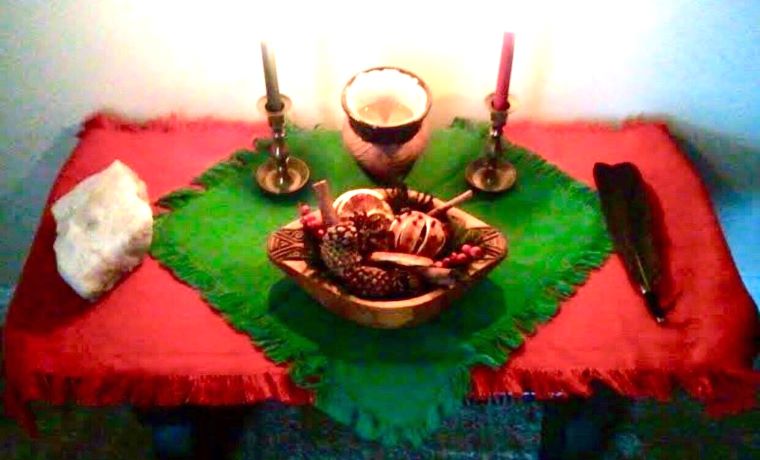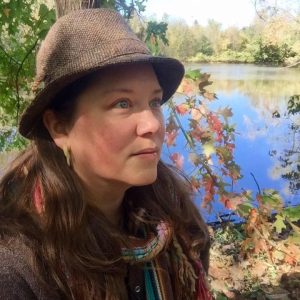
Celtic culture has been embedded in Reverend Erika Rivertree’s family life – and her personal identity – for as long as she can remember.
Although her family has been in the United States for several generations, Rivertree’s ancestors hailed from “the Celtic heartlands of Northwestern Europe,” including Scotland, Ireland, and Wales. She also has roots in England, Germany, Norway, Denmark, and Sweden.
“My last ancestor to immigrate was a maternal great-great grandmother, Mary Davidson from Invergowrie, Scotland,” says Rivertree.
Rivertree was born in Richmond, Virginia, where she spent her childhood surrounded by evidence of her family’s Celtic legacy. “I grew up listening to Scottish bagpipes, eating Scottish foods, and going to Scottish festivals with my dad, who celebrated our Clan Lamont heritage. My mom’s family are proudly Irish and a little Welsh, which has always been a prominent part of our family history. My introduction to Irish folk music and folklore was through my mom. My love of Celtic cultures and history has continued to inspire me throughout my life, and I have studied as much as I can about it along the way.”
Today, Rivertree is a Celtic Priestess living in Louisville, Kentucky. She started the Triskele Hearth fellowship in 2018, “to provide spiritual support, community, and life guidance for sacred living in the Celtic tradition.”
“I offer classes, seasonal celebrancy, all stages of life rites, and I make supportive ritual crafts such as candles, organic body care, teas and tisanes.”
While it can be challenging to get the word out about her work, Rivertree uses social media and regularly posts on a blog for The Highland Bard website. The blog covers everything from mythology to recipes. She also includes guides to her own spiritual practices, such as a candlelight contemplation in honor of Imbolg (or Imbolc) – a Celtic festival marking the midpoint between the Winter Solstice and the Spring Equinox.

“Take some time to include contemplation (by candlelight if you can) on what the spirit of this ancient holytide means for us in modern times, especially for those of us living in modern, industrialized cities,” Rivertree writes. “How do you relate to the concepts of preparation, purification, and piety, in both a practical and spiritual or mythic sense? How do you sense these flowing, or being blocked, in your life?”
Incorporating Celtic spiritual practices into one’s daily life, Rivertree explains, can be as simple as a daily devotional and prayer or contemplative practice. She recommends learning a Celtic language and then incorporating that into a regular devotional. She is currently practicing Gaelic herself. While she notes that Celtic culture is widely celebrated in America, she wishes there were more language programs available.
“The warm character of Celtic spiritual practices has a rhythm to it that flows with the change of seasons. Often it is simple offerings and prayers. They are personal and devotional in a way that is intimately connected to the local landscape. Celtic spirituality awakens you into a direct experience of sacred living through an attunement with the local landscape wherever you happen to live. It is rooted in relationships and co-creativity; this synergy of mutual interdependence and inclusivity is one reason why it is especially relevant and important today.”
In Celtic spirituality, such as Druidry or Paganism, respect for nature is key. Perhaps this is why there is such an emphasis in connecting with spirituality here on Earth, rather than trying to reach some other realm.
“There is a knowing that our everyday, waking life is not the only dimension. The influences of that way of being or perceiving are keenly felt in our extant mythology and folklore traditions. It is the idea that there is no separation from the sacred or divine. Everyday life is imbued with sacred qualities, interconnected patterns, and other ways of being that are around us all the time. I have heard this called ‘silver branch perception,’”
Those who open themselves up to these practices will experience “an awakening of the heart to authenticity, an inspired passion for life and creativity, a deeper connection to others and sense of belonging, and an awareness of how interconnected all life is that encourages living with reverent presence and integrity.”
And, for those looking to grow their own spiritual lives, Rivertree has a few words of advice: “Always keep a sense of humor, don’t take for granted either time or good health, nurture your curiosity for life, heed your intuition, and have the courage to be yourself and forge your own path in life.”
www.facebook.com/triskelehearth




















I’ve known Erika for around 20 years. Nothing outweighs authenticity. Throughout all of those years, she has been studying in earnest. No matter who is making what up, knowledge counts. It’s so nice to see someone who knows what she’s talking about being featured.
Michael, you’re a gem.